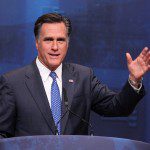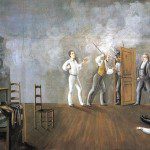
Elders Dallin H. Oaks and Robert C. Oaks may have the same grandparents, but their political views are vastly divergent.
The address of Mormon apostle Elder Dallin H. Oaks at BYU-Hawaii’s February commencement ceremony has recently been making the rounds in progressive Mormon circles. In the speech, the 84-year-old former Utah Supreme Court justice articulated concerns and a worldview that are a direct rebuke of U.S. President Donald Trump. While the Donald is on record as saying that “the concept of global warming was created by . . . the Chinese in order to make U.S. manufacturing non-competitive,” Elder Oaks stated unequivocally that global warming is responsible for rising ocean levels and negative impacts on agriculture and wildlife. And while Trump advocates for rollbacks in the poverty-alleviating advances of free trade, Elder Oaks alluded to “disturbing developments” that threaten free trade. But the most overt jab at our pugilistic president came when Elder Oaks decried “the politics of conflict and the uncertainties sponsored by the aggressive new presidential administration in the world’s most powerful nation.”
It’s obvious from his remarks that Elder Oaks is not a fan of Donald Trump and that he sees him as a troubling threat to world prosperity and order. I agree with Elder Oaks’s view of our rash, impulsive president and his critiques of Trump’s destructive policy proposals. At the same time, I can’t help but be intrigued by the contrast between Elder Dallin H. Oaks’s views and those of his first cousin, emeritus LDS general authority Robert C. Oaks. That Elder Oaks, a retired Air Force general, shocked Utah politics when, during the 2016 Republican primaries, he endorsed the Donald and served on his Utah campaign committee. When doing so, he asserted the puzzling view that Donald Trump, a draft-dodger who had previously said “I know more about ISIS than the generals do,” was his pick because of his supposed fitness to be Commander in Chief. Later, he penned an op-ed for the Deseret News in which he referred to the perpetually bankrupt mogul’s “record of success” as another reason for his support. He even persisted in his support after the publication of the infamous Access Hollywood video, speaking in favor of Trump during an October 2016 rally in Salt Lake City.
The contrast between Elder Dallin H. Oaks’s views and those of his cousin couldn’t be starker. While Dallin Oaks has used the critical thinking skills he honed as a lawyer and jurist to cut through Trump’s unartful attempts at sophistry, Robert Oaks has fallen for his jingoistic bluster hook, line, and sinker. And while Dallin Oaks views Trump’s aggressive, bellicose rhetoric as a threat to the international order that has preserved peace and prosperity since World War II, Robert Oaks views such talk as a sign of military strength and prowess, never mind Trump’s snubbing of NATO, antagonism towards key allies, terrorism-inspiring Islamophobia, and unhealthy admiration for Russian autocrat Vladimir Putin.
Beyond the intriguing nature of the rift between the Oaks cousins, their ideological divide inspires more serious questions. Chief among these is, “Did Robert Oaks have permission to engage in his pro-Trump efforts?” We know that emeritus general authorities, despite no longer being in active Church service, must abide by the counsel and advice of the Brethren or risk losing their retirement pensions. And, given his fierce denunciation of Trumpism, it seems unlikely that Dallin Oaks gave the go-ahead for Robert Oaks to endorse Trump. So was Dallin Oaks overruled by other members of the First Presidency and Quorum of the Twelve on this matter? Or was Robert Oaks actually acting contrary to what the Brethren had counseled? If so, has he lost his Church pension?
Of course, we will probably never know the answers to the questions posed above. But the clashing views of the Oaks cousins is a good reminder that, even in the overwhelmingly conservative culture of the LDS Church, the political views of Church leaders, even those from the same family, are by no means monolithic.











